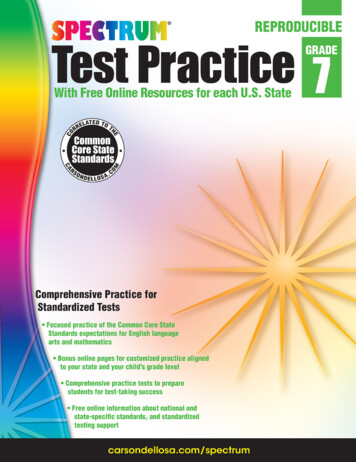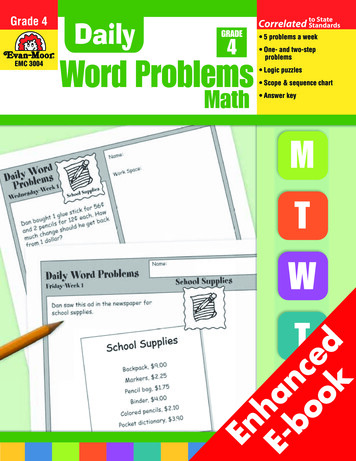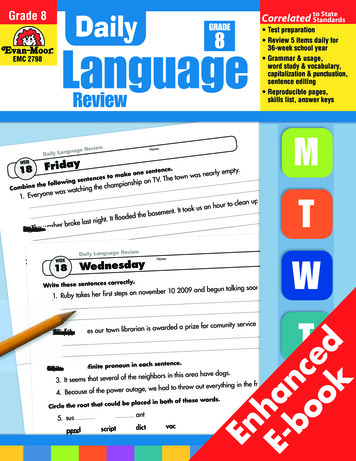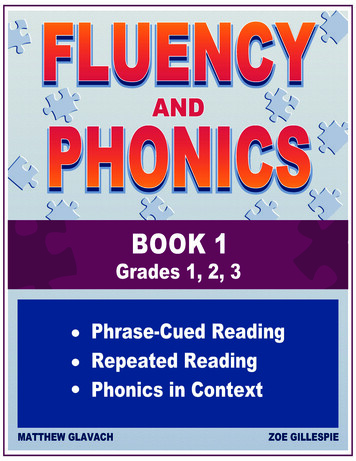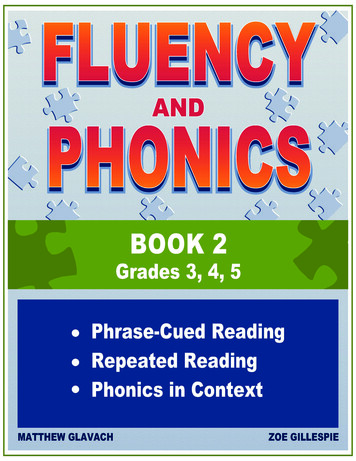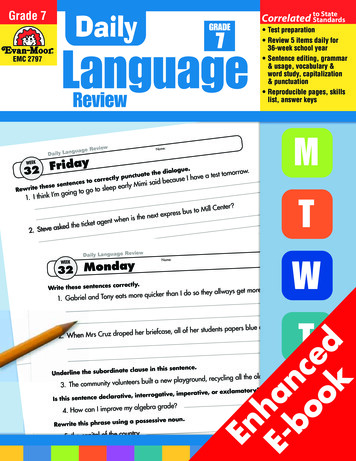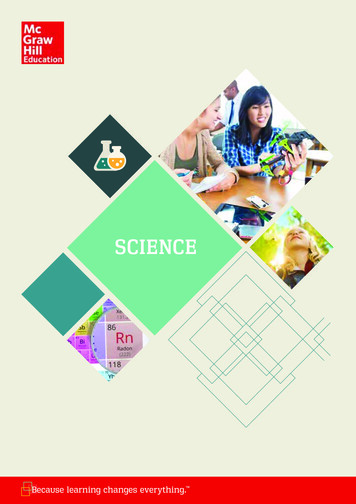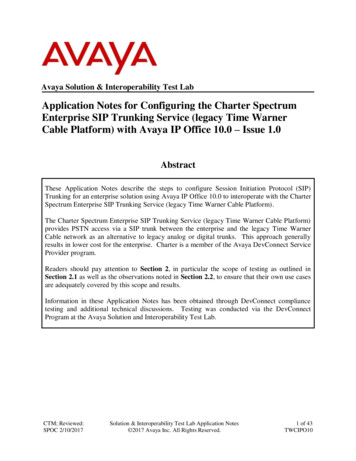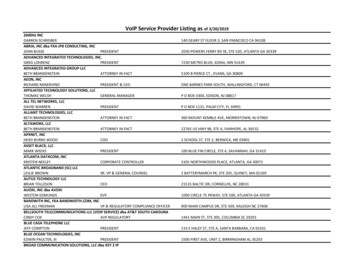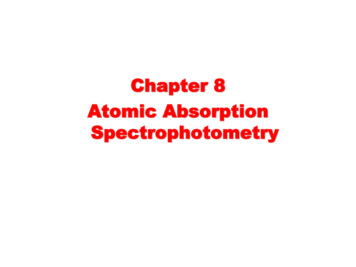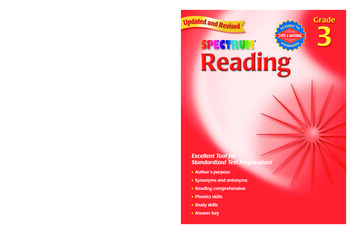
Transcription
0-7696-3863-5COSPECT 5/16 spine 1/12/12 9:30 AM Page 1Making Children More Successful! Spectrum , our best-selling workbook series, provides quality educational activitiesthat meet students’ needs for learning achievement and success.READINGSpectrum Reading Grade 3 helps young learners improve and strengthen theirfiction and nonfiction reading skills, such as: Author’s purpose Synonyms and antonyms Reading comprehension Phonics skills Study skills Grade 3Reading (Grades K–6)Math (Grades K–8)Spelling (Grades 1–6)Writing (Grades 1–8)Language Arts (Grades 2–6)Vocabulary (Grades 3–6)Test Prep (Grades 1–8)Excellent Tool forStandardized Test Preparation!Test Practice (Grades 1—8)Geography (Grades 3–6)Phonics (Grades K–3)Word Study and Phonics (Grades 4–6)Science Test Prep (Grades 3–8)Enrichment Math (Grades 3–8)Science (Grades 3–8)Spectrum An imprint of Carson-Dellosa Publishing LLCP.O. Box 35665 Greensboro, NC 27425 USAwww.carsondellosa.comUPCEANU.S. 9.95 Author’s purposeSynonyms and antonymsReading comprehensionPhonics skillsStudy skillsAnswer key
0-7696-3863-5COSPECT 5/16 spine 1/12/12 9:30 AM Page 2n moreWe’re making childreing educationalsuccessful by providthe researchworkbooks based ons!of educational expertand Educators:To Parents, Caregivers,skills they needped with the essentialuipeqbetoednentsstudetrum series hasToday, more than ever,iency tests. The Specficproonsesccsuforanddent achievement.for school achievementills and to enhance stu sksethehwitntsdere stum workbookbeen designed to prepaeach title in the Spectru,onatiucedofldfiein theective sequence forDeveloped by expertsreinforcement in an eff danonctitruinsateproprim is the learningseries offers grade-apand at home, Spectrumsroossclaineusct forlearning success. Perfeachievement.forednentsdepartner stuptional features: ading offers these exceRemtruecSp,ntsFor studeognition,ness, phonics, word recareawicemonphinillssk Activities that reinforcemprehension.cogdinreadandecoding,nt areas.ages in curriculum conte Engaging, lively passcomprehension.s that provide cues to Full-color illustration truction. Enjoyable reading insy. A complete answer kem Reading offers:For parents, Spectruficiency.developing reading pro A proven method for.and make reading funt encourage creativitythasiseercexeticacPr directions. Easy-to-understandand are aligned are classroom-testedsriesemtruecSpks in theBest of all, the workboontent standards.colnatioto state and naol success,child meets with schouryoresuenlwiltthamaterialsTo find other learning.com.sallodeonvisit www.cars(name)HAS MASTERED THE SKILLS INTHIS SPECTRUM READING WORKBOOK.(signature)(date)
0-7696-3863-5CISPCWBK.qxdsec.1 0-7696-3863-5CISPCWBK.qxdsec.1 2/2/12 7:06 AM Page i ReadingGrade 3Spectrum An imprint of Carson-Dellosa Publishing LLCP.O. Box 35665Greensboro, NC 27425 USA 2007 Carson-Dellosa Publishing LLC. Except as permitted under the United States Copyright Act, no part of thispublication may be reproduced, stored, or distributed in any form or by any means (mechanically, electronically,recording, etc.) without the prior written consent of Carson-Dellosa Publishing LLC. Spectrum is an imprint ofCarson-Dellosa Publishing LLC.Printed in the USA All rights reserved.
0-7696-3863-5CISPCWBK.qxdsec.1 0-7696-3863-5CISPCWBK.qxdsec.1 10/5/10 3:19 PM Page iiIndex of SkillsReading Grade 3Numerals indicate the exercise pages on which these skills appear.Vocabulary SkillsAbbreviations 33, 61, 93, 103, 133Antonyms 9, 27, 53, 65, 77, 91, 105, 123, 139Base Words and Endings 3, 19, 35, 39, 47, 69, 85,105, 119, 141Classification 7, 23, 39, 51, 67, 81, 101, 119, 135Compound Words 11, 27, 43, 63, 75, 101, 115, 143Contractions 23, 39, 81, 91, 117, 139, 147Homographs 15, 45, 59, 97, 119Homophones 15, 31, 45, 55, 75, 107, 137, 149Irregular Spellings 31, 73, 97, 121, 141Meaning From Context 3, 7, 11, 19, 21, 29, 37, 41,43, 47, 49, 53, 55, 61, 65, 71, 73, 79, 81, 85, 89, 95,101, 105, 109, 121, 127, 131, 137, 147Multiple Meanings 25, 35, 89, 103, 129Multisyllabic Words 5, 49, 73, 107, 127, 147Possessives 21, 47, 69, 87, 111, 123, 145Prefixes and Suffixes 9, 19, 43, 63, 79, 107, 115, 125,151r-Controlled Vowels 17, 37, 51, 71, 95, 115, 131, 145Singular and Plural 3, 25, 45, 59, 79, 109, 117, 135,151Syllables 13, 29, 57, 77, 99, 113, 133, 149Synonyms 5, 21, 41, 71, 93, 111, 129, 145Variant Sounds 27, 49, 67, 113, 129, 141Vowel Digraphs and Diphthongs 17, 33, 57, 83, 111,125, 143Reading SkillsCause and Effect 11, 13, 31, 45, 61, 95, 111, 129, 151Character Analysis 5, 23, 25, 53, 75, 91, 105, 127,137Comparison and Contrast 19, 21, 51, 73, 97, 109,125, 127, 143Facts and Details 3, 9, 15, 19, 27, 37, 47, 55, 57, 73,95, 105, 115, 135, 143, 147Give Purpose for Reading allIdentify Authorʼs Purpose 13, 39, 77, 83, 117, 139Main Idea 3, 9, 19, 29, 37, 47, 55, 73, 79, 95, 105,115, 139, 147Predicting Outcomes 3, 25, 35, 41, 51, 79, 97, 107,119, 145Reality and Fantasy 15, 35, 53, 71, 81, 99, 111, 141Recognize Features of Familiar Genres, IncludingStories, Informational Text, etc. 5, 27, 49, 59, 65, 85,99, 117, 123, 151Recognize Storyʼs Problem 29, 45, 63, 71, 107Sequence 7, 17, 33, 69, 87, 99, 103, 129, 133, 151Show Comprehension by Identifying Answers in Text15, 33, 45, 59, 75, 89, 109, 137Understand and Identify Simple Literature Terms (e.g.,author, illustrator, dialogue, etc.) 29, 39, 43, 63, 89,111, 131Use Prior Knowledge 5, 21, 41, 67, 73, 91, 107, 113,133, 143Word Referents 13, 43, 69, 87, 101, 137, 149Study SkillsAlphabetical Order 9, 41, 75, 87, 117, 131, 143, 149Dictionary Use 11, 55, 65, 91, 113, 127Following Directions allInterpret Information Diagrams, Graphs, Charts 7, 27,61, 77, 93, 109, 125Parts of a Book 57, 103, 123Reference Materials 67, 83, 95, 121, 141Use Titles, TOC, Headings, Glossaries, Indexes toLocate Information 13, 21, 37, 61, 67, 85, 109, 121,125Context Clues 11, 23, 43, 51, 57, 81, 93, 107, 117,139, 149Drawing Conclusions 3, 17, 31, 41, 47, 61, 67, 85,101, 113, 131, 145Fact and Opinion 17, 39, 49, 59, 83, 101, 115, 135,147Spectrum Reading Grade 3iiIndex of Skills
0-7696-3863-5CISPCWBK.qxdsec.1 0-7696-3863-5CISPCWBK.qxdsec.1 10/5/10 3:19 PM Page 1Table of ContentsTwo Boys, Big Plans . . . . . . . . . . . . . . . . . 2One Tent, Lots of Stuff. . . . . . . . . . . . . . . . 4How to Pitch a Tent . . . . . . . . . . . . . . . . . . 6One Tent What Next? . . . . . . . . . . . . . . . 8Night Lights . . . . . . . . . . . . . . . . . . . . . . . 10Thunder and Lightning . . . . . . . . . . . . . . 12Smokey the Bear . . . . . . . . . . . . . . . . . . . 14Planting Dreams . . . . . . . . . . . . . . . . . . . 16Dreaming of the Harvest . . . . . . . . . . . . . 18Peppers . . . . . . . . . . . . . . . . . . . . . . . . . . 20The Pie Man . . . . . . . . . . . . . . . . . . . . . . 22Once a Pie Man, Always a Pie Man . . . . 24New York Cityʼs Gem. . . . . . . . . . . . . . . . 26Soccer Blues . . . . . . . . . . . . . . . . . . . . . . 28Mom to the Rescue . . . . . . . . . . . . . . . . . 30Power Snack . . . . . . . . . . . . . . . . . . . . . . 32And Itʼs Out of the Park! . . . . . . . . . . . . . 34History of Soccer . . . . . . . . . . . . . . . . . . . 36Why Soccer? . . . . . . . . . . . . . . . . . . . . . . 38A Teacherʼs Journal . . . . . . . . . . . . . . . . . 40A Studentʼs Journal . . . . . . . . . . . . . . . . . 42The Great Volcano Debate . . . . . . . . . . . 44The End of a Volcano Tale . . . . . . . . . . . 46Volcanoes . . . . . . . . . . . . . . . . . . . . . . . . 48And the Next Unit Is . . . . . . . . . . . . . . . 50So Many Ideas . . . . . . . . . . . . . . . . . . . . 52Too Many Ideas! . . . . . . . . . . . . . . . . . . . 54Forest Mammals . . . . . . . . . . . . . . . . . . . 56Snakes: Love Them or Leave Them? . . . 58Redwood Giants . . . . . . . . . . . . . . . . . . . 60Problem Solved . . . . . . . . . . . . . . . . . . . . 62The Hamster From Room 144 . . . . . . . . 64Caring for a Pet Hamster . . . . . . . . . . . . 66Skyway Sweeper . . . . . . . . . . . . . . . . . . . 68Rooftop Keeper . . . . . . . . . . . . . . . . . . . . 70The Dirt on Soil . . . . . . . . . . . . . . . . . . . . 72Frederickʼs Secret . . . . . . . . . . . . . . . . . . 74Buildings: From Tall to Taller . . . . . . . . . . 76Magic With Flowers . . . . . . . . . . . . . . . . . 78Magic With Wiggles . . . . . . . . . . . . . . . . . 80Houdini . . . . . . . . . . . . . . . . . . . . . . . . . . 82David Copperfield . . . . . . . . . . . . . . . . . . 84Wiggles Reappears . . . . . . . . . . . . . . . . . 86Field Trip . . . . . . . . . . . . . . . . . . . . . . . . . 88Riddles Along the Way . . . . . . . . . . . . . . 90One Great Wall . . . . . . . . . . . . . . . . . . . . 92Spectrum Reading Grade 3A Wall of Names . . . . . . . . . . . . . . . . . . . 94A Farm From Long Ago . . . . . . . . . . . . . . 96In the Barn . . . . . . . . . . . . . . . . . . . . . . . . 98In the Kitchen . . . . . . . . . . . . . . . . . . . . 100Baking Bread . . . . . . . . . . . . . . . . . . . . . 102All About the Farm. . . . . . . . . . . . . . . . . 104Caught in Traffic . . . . . . . . . . . . . . . . . . 106How Many Are There?. . . . . . . . . . . . . . 108Sidewalk Art . . . . . . . . . . . . . . . . . . . . . . 110Wishes on the Sidewalk . . . . . . . . . . . . 112Drawings on the Wall. . . . . . . . . . . . . . . 114Roman Wall Art . . . . . . . . . . . . . . . . . . . 116From Lucy . . . . . . . . . . . . . . . . . . . . . . . 118At the Shore . . . . . . . . . . . . . . . . . . . . . 120From Isabel . . . . . . . . . . . . . . . . . . . . . . 122The Dominican Republic . . . . . . . . . . . . 124Lucy and Isabel: Pen Pals. . . . . . . . . . . 126Phone Troubles . . . . . . . . . . . . . . . . . . . 128Phone Manners . . . . . . . . . . . . . . . . . . . 130Hold the Phone!. . . . . . . . . . . . . . . . . . . 132Telephones: How Do They Work?. . . . . 134Honey to the Rescue. . . . . . . . . . . . . . . 136Honey . . . . . . . . . . . . . . . . . . . . . . . . . . 138A Sad Song . . . . . . . . . . . . . . . . . . . . . . 140What Is Folk Music? . . . . . . . . . . . . . . . 142Peanut Butter Plus . . . . . . . . . . . . . . . . 144Working for Peanuts . . . . . . . . . . . . . . . 146All Wrapped Up . . . . . . . . . . . . . . . . . . . 148Making Prints. . . . . . . . . . . . . . . . . . . . . 150Answer Key . . . . . . . . . . . . . . . . . . . . . . 152Table of Contents1
0-7696-3863-5CISPCWBK.qxdsec.1 0-7696-3863-5CISPCWBK.qxdsec.1 10/5/10 3:19 PM Page 2Two Boys, Big PlansRead to see what Sam and Kentare planning.1“Okay, I’m going to ask my parentsright now. Are you?” Sam waited forKent’s reply over the phone.2“I think so,” said Kent after amoment. “My dad just got home alittle while ago. Are you bringingcrackers?”3Sam laughed. Kent was alwayshungry. “Yes, I’ll bring the crackers,”he said. “And be sure to tell them thatwe’ll turn the lights out by 9:30. Okay?”4“Nine-thirty. Right,” Kent agreed.“Okay, I’m going to go ask. I’ll talk toyou in a little bit.”9Mr. and Mrs. Hume blinked, thenlooked at each other. How do theytalk to each other without sayinganything, wondered Sam.10“Did Kent’s parents say it wasokay?” asked Mrs. Hume.11“He’s asking right now.” Sam shiftedfrom one foot to the other. Anotherlook passed between his parents.12Mr. Hume nodded. “If Kent’sparents say it’s okay, it’s okay with us.”13“Thanks, Dad! Thanks, Mom!” calledSam as he dashed for the phone. Hedialed and held his breath. Then, heheard Kent’s voice.14“Okay?” asked Sam.15“Okay!” said Kent.5“Okay,” answered Sam, and hehung up. Now, if only we can talk ourparents into letting us do this, hethought to himself. He put on a bigsmile and entered the family room.6“Dad?” said Sam quietly so hewouldn’t make his father jump. “Icleaned up those grass clippingsfor you.”7“Oh, good,” nodded Mr. Hume.“Thanks, Sam.”8“Mom? Dad?” started Sam again.Both his parents looked over theirnewspapers. The words rushed out ofSam. “Kent and I were wondering if wecould sleep out in the tent tonight.We’d be warm enough in our sleepingbags, and we won’t eat too much, andit’ll be lights out at 9:30, we promise.”Spectrum Reading Grade 32
0-7696-3863-5CISPCWBK.qxdsec.1 0-7696-3863-5CISPCWBK.qxdsec.1 10/5/10 3:19 PM Page 3NAMEWrite the words from the story thathave these meanings.1. answer1. This story is mostly abouta sleepover.Sam’s parents.Par. 12. inquirePar. 43. went intoPar. 54. went quicklyPar. 8A word without an ending is a baseword. Circle the base word in each ofthe words below.5. bringing6. lights7. quietly8. blinkedA word that names one of somethingis singular. A word that namesmore than one is plural. Most wordsare made plural by adding an sat the end. Write the plural form ofthese words.two boys’ plans.2. At the beginning, when Samand Kent are talking on thephone, what did you think theymight be talking about?3. In the story, when did you find outwhat the boys are planning?4. Why do you think Sam told his dadabout the grass clippings?9. cracker5. Why does Sam mention beingwarm enough and when the lightswill be turned out?10. parent11. tent12. word6. Now that the boys have permission,what do you think they will do next?Spectrum Reading Grade 33
0-7696-3863-5CISPCWBK.qxdsec.1 0-7696-3863-5CISPCWBK.qxdsec.1 10/5/10 3:19 PM Page 4One Tent, Lots of StuffWhat do the boys need for their nightin the tent?1“Lantern?”2“Got it.”3“Sleeping bags?”4“Got it—both of them.”5“Pillows?”6“Two fat ones.”7“Crackers?”8“Three kinds.”9“Three kinds? Great!”10Sam and Kent had made a list of allthe things they needed for sleepingout in the tent. Now, they were sittingcross-legged in the tent, checkingthings off the list.11“Are you going to bring a bathrobeand slippers?” Kent asked Sam.12“Oh, no! We’re camping. Thoseare just for in the house,” answeredSam, looking as if he knew allabout camping.13“Oh, right,” said Kent, who hadnever been camping before. Hedidn’t think Sam had been campingbefore either. Still, it was Sam’s dad’stent, so he must know.14“Oh, I almost forgot. Can you bringyour baseball glove?” Sam lookedvery serious.15Kent couldn’t figure this one out.“My baseball glove? What do weneed that for?”16“Well, we just might. You neverknow,” said Sam with mysteryand authority.17“Okay,” shrugged Kent, “I’ll bringit when I come after supper. Whattime do you think you’ll be able tocome out?”18Sam thought for a moment. “Weusually eat at 5:45. Then, I have toclear the table. I should be done by6:30. What about you?”19“My dad doesn’t get home until sixo’clock,” said Kent, regretfully.“Maybe if I offer to help Mom withsupper, things will go quickly.”20Sam shrugged. “It’s worth a try.Come out as soon as you can.” Samlooked around the tent. “Okay, I thinkeverything’s ready. I’ll see you later.”21“See you later,” said Kent, and theboys both ran home.Spectrum Reading Grade 34
0-7696-3863-5CISPCWBK.qxdsec.1 0-7696-3863-5CISPCWBK.qxdsec.1 10/5/10 3:19 PM Page 5NAME3. Kent says he might help his momwith supper. What does that tellyou about Kent?Words that mean the same, or nearlythe same, are called synonyms. Circlethe pair of synonyms in each row.1. many fat all countless2. serious narrow unsmiling busy3. special after moment instant4. shortly later soon gladly5. helpful finished glum doneEach word part is called a syllable.The words below are broken intosyllables. Sound out each syllable.Then, write the word and say it toyourself as you write.6. mys/ter/y4. Based on what you know aboutcamping, how do you feel aboutall the stuff the boys have in theirtent? List what you think they needand what they don’t need.What They NeedWhat They Don’t Need7. au/thor/i/ty8. re/gret/ful/ly1. One of the boys usually has theideas. The other one seems to goalong with those ideas. Which boyis the “leader”?2. What details from the story helpedyou answer question 1?5. In some stories, the author tells youwhat is happening. In this story, theauthor uses mostly dialogue, whatthe characters say, to let youknow what is going on. Chooseone line of dialogue and writewhat it helps you know about thecharacter.Dialogue:Spectrum Reading Grade 35
0-7696-3863-5CISPCWBK.qxdsec.1 0-7696-3863-5CISPCWBK.qxdsec.1 10/5/10 3:19 PM Page 6How to Pitch a TentFollow these instructions to learn howto pitch a tent.These general instructions shouldallow anyone to pitch any size or styleof tent. Keep in mind that pitching atent alone, even if you haveexperience, is difficult.5. Put together the tent poles, ifnecessary. Thread each onethrough its loops or channels. Donot step or walk on the tent to dothis. If necessary, crawl or lie downon your stomach to reach thecenter of the tent.1. Choose a flat area on which topitch your tent. Remove any stonesor rocks that might poke throughthe tent’s floor.2. Take the tent and all equipmentout of the storage bag. Layeverything on the ground neatly.3. Spread a groundcloth over thechosen spot. Then, lay the tentfloor, over the groundcloth. Foldthe edges of the groundclothunder, so they do not stick out fromthe edges of the tent.6. Raise the poles. If you have apartner, work on opposite sides ofthe tent.7. Pull the guy lines straight out fromthe sides of the tent. Peg each one.4. Make sure the tent door is zippedshut. Then, pound a stake througheach loop, pulling snugly as yougo so the floor gets stretched toits full size.Spectrum Reading Grade 36
0-7696-3863-5CISPCWBK.qxdsec.1 0-7696-3863-5CISPCWBK.qxdsec.1 10/5/10 3:19 PM Page 7NAME2. Number the sentences to show theorder to pitch a tent.Write the words from the article thathave these meanings.Spread out groundcloth.Tighten and peg guy lines.Choose and clear an area.1. to push throughPut together tent poles.Step 12. with care and orderLay out equipment.Pound stakes through loops.Step 2Raise the poles.3. to strike heavilyStep 44. middle or interior pointStep 5In each row below, circle the threewords that belong together.5. grass stones rocks pebbles6. set lay put jet7. tight windy snug stretched8. haul pull snap heave1. If you don’t know or understandwhat a guy line is, which illustrationhelps you figure it out? Tell how.1. What do you know about pitchinga tent? Do you have anything toadd to these instructions?2. Choose one illustration. Explainwhat it shows.Spectrum Reading Grade 37
0-7696-3863-5CISPCWBK.qxdsec.1 0-7696-3863-5CISPCWBK.qxdsec.1 10/5/10 3:19 PM Page 8One Tent What Next?What do the boys expect to happen?1“Then, there was the time mybrother and I nearly got blown awaywith the tent! Did I tell you about thatone?” Sam shook his head and triednot to look impatient. His dad hadbeen telling camping stories for almostan hour. How can I get him to stopwithout saying anything? thought Samto himself. He really wanted to get outto the tent.2Finally, his dad stopped for a biteof dessert, and Sam asked to beexcused. When his mom nodded herokay, it took only four trips to clear thetable. Then, he was off and across thebackyard.3“Caught you!” yelled Sam as heflipped back the tent flap. Kentjumped and turned red. “Ha! I knewit! In the crackers already.” Then,he laughed. “Have you beenwaiting long?”4Kent shook his head because hismouth was full. Finally, he said, “Notlong. My dad got home late.”5Sam shrugged. “Oh, well. We’rehere now. Let’s get ready.”6“Ready for what?” asked Kent.7“For whatever’s going to happen,”answered Sam. Well, he must know,thought Kent. He helped Samstraighten the sleeping bags and stashstuff in the corners. They played catchacross the tent for a little while. Ah, thebaseball glove, thought Kent. Theyplayed badminton with crackers, butthen Sam discovered crumbs in hissleeping bag, so they stopped.8They turned on the lantern andread. After a while, Sam retold someof his dad’s camping stories. Then,Kent turned out the light, and theylistened for noises in the dark. Theydidn’t hear any for a very long time.9Finally, Kent heard something atthe tent flap. He half crawled andhalf flew across the tent to warn Sam.Sam yelled when Kent landed on topof him.10“Hey, are you guys all right?” It wasSam’s mom. “Breakfast is ready.”11Sam and Kent looked at eachother in disbelief. They had sleptthrough the whole night, and nothinghad happened.Spectrum Reading Grade 38
0-7696-3863-5CISPCWBK.qxdsec.1 0-7696-3863-5CISPCWBK.qxdsec.1 10/5/10 3:19 PM Page 9NAMEWords whose meanings are oppositeare called antonyms. Match eachword in the first list with its antonym inthe second list. Write the letter in theblank.1. asleepa. night2. darkb. awake3. dayc. crooked4. straightd. lightA prefix is a group of letters added tothe beginning of a word that changesthe meaning of a word.The prefix re- means “again.”1. Which sentence best describesthis story?Nothing exciting happensto the boys in the tent.The boys have a crazy nightin the tent.In the morning, Kent playsa trick on Sam and scareshim.2. Why did the boys stop playingbadminton? retold means “told again”The prefix im- means “not.” impatient means “not patient”Write the correct word next to itsmeaning.impoliteimpossiblereappearrefill5. fill again6. not possibleNumber each list of words below inalphabetical order.1. tent2. lanterncampingnoiseshourcrackersbrotherflap7. appear again8. not politeSpectrum Reading Grade 39
0-7696-3863-5CISPCWBK.qxdsec.1 0-7696-3863-5CISPCWBK.qxdsec.1 10/5/10 3:19 PM Page 10Night LightsWhat is keeping Mikki awake?1There were lights flashing outside.No matter what I did, I could see thoselights. I couldn’t figure out what theywere, so I started worrying.2I turned away from the windowand closed my eyes. But then I hadto open them, just a crack, to seeif the lights were still there. Flash-flash,off, flash!3I rolled toward the window andwatched. Maybe I could figure it out.I started listing things. Car lights? Notbright enough. Police car flashers?Not blue and red enough. Spaceships? Not likely. All right, this is reallybugging me. I have to go ask Mom, Ifinally concluded.4I padded downstairs where mymom was reading a magazine. Shewas a little surprised to see me.5“The lights are flashing upstairs,”I said.6“They are?” She said it with that“this is a great excuse for being out ofbed” look on her face.7“I can’t figure out what it is,” Icontinued, hoping for somecomfort. To my relief, she put downher magazine and steered meback upstairs.8We laid across my bed on ourstomachs and watched out thewindow. Mom knew right away.Spectrum Reading Grade 3109“Mikki, do you remember drivingup to visit Uncle Walt last month?” sheasked. I nodded. “Do you rememberhow long it took?” I nodded again.“Well, Uncle Walt is having athunderstorm way up north where hishouse is. The lightning is sort of shiningoff the clouds, so we can see theflashing down here, even though thestorm is far away from us.”10“Oh,” I said. I thought to myself,Well, that makes sense. After all, whatelse causes lights to flash in the sky?Aliens? Not likely.
0-7696-3863-5CISPCWBK.qxdsec.1 0-7696-3863-5CISPCWBK.qxdsec.1 10/5/10 3:19 PM Page 11NAMEThen, she.Write the words from the story thathave these meanings.1. light appearing in brief burstsPar. 12. feeling anxious or upsetPar. 13. reasonPar. 64. relief from worry3. What is causing the flashing lights?4. Have you ever been kept awakeat night by something thatbothered or puzzled you? Writeabout it.Par. 7A compound word is made bycombining two smaller words. Use theunderlined words in each sentence toform a compound word. Write theword in the blank.5. A room that is down the stairs is.6. A storm that includes thunder is a.1. What is causing Mikki to worry?2. What does Mikki do to try to get tosleep?First, sheEach word you look up in a dictionaryis called an entry word. Most entrywords are base words. That is, theydon’t have endings. So, to look up theword worrying, you should find thebase word worry. Write the correctentry word in each blank.To Look UpFind the Entry Word1. rolled2. watched3. listing4. flashing5. continued.Spectrum Reading Grade 311
0-7696-3863-5CISPCWBK.qxdsec.1 0-7696-3863-5CISPCWBK.qxdsec.1 10/5/10 3:19 PM Page 12Thunder and LightningWhat causes thunder and lightning?Thunder Second15The story of thunder and lightning isa lesson on electricity. Lightning isreally just a giant electrical spark.Thunder is a direct result of the activityof that spark.Lightning First2Imagine a single water droplet highabove Earth. It is in a cloud amongmillions of other water droplets. As thiswater droplet falls toward Earth, it getsbigger by collecting more moisture.When the droplet gets to just aboutthe size of a pea, it splits. This splittingaction causes an electrical charge tobuild up on the two new droplets.3If the droplets fall straight to Earth,the electrical charge is very small andwill have no effect. If the droplets getswept upward by air currents,however, the whole process beginsagain. The droplets fall, grow, split,and become more strongly chargedwith electricity each time.4In time, the electrical charge in thedroplets becomes so strong that it hasto discharge itself. The result is a hugespark. It may leap from a cloud to theground in less than one-tenth of asecond. We know it as lightning.Spectrum Reading Grade 312When lightning flashes, the air issuddenly heated, then it quickly cools.These rapid changes in the air causethe cracking sound of thunder. Duringa storm, we see lightning first, thenwait to hear the thunder. That’sbecause light travels faster thansound. We see the lightning as ithappens, but the sound of the thundermay take any number of seconds toreach us, depending on how far awaythe lightning was. The rumbling soundof thunder is actually an echo fromthe sound waves bouncing off Earth oroff the clouds.
0-7696-3863-5CISPCWBK.qxdsec.1 0-7696-3863-5CISPCWBK.qxdsec.1 10/5/10 3:19 PM Page 13NAME4. How does lightning cause thunder?A word part is called a syllable.When a word has two consonantsbetween two vowels, the syllables aredivided between the two consonants.For example, number is divided likethis: num / ber.For each word below, draw a line todivide the word into syllables.1. d r o p l e t2. e f f e c t3. c u r r e n t s4. f a s t e r5. h a p p e n sWords such as he, she, you, it, andthem are called pronouns. They areused in place of other nouns. Readthis sentence:Ty heard thunder when hewoke up.In the sentence, he stands for Ty.Now, read each sentence below. Fillin the blank.5. When the droplet gets too big,it splits.It stands for .6. Lynn ran for cover, but she gotwet anyway.1. The author wrote this article toentertain.give information.She stands for .7. The girls thought they saw lightning.They stands for .persuade.2. Which comes first, thunder orlightning?3. What causes lightning? Give abrief answer.1. If you read only the two headingsin this article, what would youlearn?Spectrum Reading Grade 313
0-7696-3863-5CISPCWBK.qxdsec.1 0-7696-3863-5CISPCWBK.qxdsec.1 10/5/10 3:19 PM Page 14Smokey the BearRead to find out how Smokey the Bearbecame famous.1Smokey the Bear’s story doesn’tstart with a bear. It starts with aproblem, a solution, and then adrawing.2In the 1940s, during World War II,the leaders of the United States hada problem. They were worried abouthaving enough wood to build shipsand other equipment for the war.The solution: To protect America’sforests (and the wood that might beneeded for ships), the U.S. ForestService started a campaign to preventforest fires.3The Forest Service created postersreminding people about fire safety.The posters featured a deer namedBambi from a popular movie. Beforelong, however, the poster imageswere switched to a popular toyanimal—a bear. An illustrator, AlbertStaehle, drew that first bear with apark ranger’s hat in 1944 and namedhim Smokey.4Six years later, while fighting a forestfire in New Mexico, firefighters found ablack bear cub clinging to a tree.They rescued the cub and called itHotfoot. Soon, however, the cub wasrenamed Smokey after the drawingson the posters.Spectrum Reading Grade 3145Once he recovered from his injuries,Smokey was taken to the National Zooin Washington, D.C. Thousands ofpeople visited him there until he diedin 1976. Smokey was 26 years old. Hismessage is still with us, however, as wesee him reminding us to prevent forestfires all across the nation.
0-7696-3863-5CISPCWBK.qxdsec.1 0-7696-3863-5CISPCWBK.qxdsec.1 10/5/10 3:19 PM Page 15NAMEHomophones are words that soundalike but have different spellings anddifferent meanings. Complete eachsentence below by writing the correctword in the blank.1. Smokey the is easyto recognize. (Bare, Bear)2. The in our forests isvaluable. (wood, would)Homographs are words that arespelled the same but have differentmeanings. For example, bat canname a stick used in baseball or aflying mammal. Choose the correctword below to complete each pairof sentences.parkships3. The were lined upin the harbor.Grandma alwaysa package for my birthday.4. I looked for a place tothe car.We had a picnic in the.Put a check next to the sentences thatare true.1. The idea for Smokey theBear started in the 1940s.2. Smokey the Bear lives inNew Mexico.3. The Forest Service madeposters in honor of a bearcub that died in a fire.4. Smokey the Bear was adrawing first, then a realbear.Write M next to the sentences that tellabout make-believe things.5. Smokey the Bear lived in azoo for many years.6. Smokey the Bear speaks tocampers about the dangerof forest fires.7. Smokey the Bear used tohelp firefighters put out fires.8. Why was Smokey the Bearcreated? Write the phrase orsentence from the article thattells you.Spectrum Reading Grade 315
0-7696-3863-5CISPCWBK.qxdsec.1 0-7696-3863-5CISPCWBK.qxdsec.1 10/5/10 3:19 PM Page 16Planting DreamsWhat does Rosa dream about?1She was walking home from workone evening when she got the idea.Rosa didn’t like her job at the factory,but it w
Spectrum Reading Grade 3 helps young learners improve and strengthen their fiction and nonfiction reading skills, such as: AuthorÕs purpose Phonics skills Synonyms and antonyms Study skills Reading comprehension Reading (Grades KÐ6) Math (Grades KÐ8) Spelling (Grades 1Ð6) Writing
